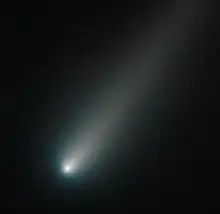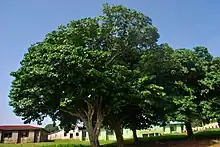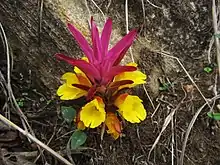coma
English
Pronunciation
- (UK) IPA(key): /ˈkəʊmə/
Audio (Southern England) (file) - (US) enPR: kōʹmə, IPA(key): /ˈkoʊmə/
- Rhymes: (UK) -əʊmə, (US) -oʊmə
- Homophone: comber (in non-rhotic accents)
Etymology 1
Borrowed from Ancient Greek κῶμα (kôma, “deep sleep”).
Noun
coma (plural comas)
- A state of unconsciousness from which one may not wake up, usually induced by some form of trauma.
- go into a coma
- slip into a coma
- come out of a coma
- 2004, Carlin, George, When Will Jesus Bring the Pork Chops?, New York: Hyperion Books, →ISBN, OCLC 757869006, OL 24604921M, page 208:
- I wonder if a person who comes out of a coma feels refreshed and well rested.
Derived terms
- comalike
- comatic
- comatose
- coma vigil, coma vigile
- dot-coma
- food coma
- hyperosmolar coma
- hyperosmolar hyperglycemic nonketoic coma
- induced coma
- precoma
- pseudocoma
- semicoma
- turkey coma
Related terms
- comatose
Translations
|
See also
- persistent vegetative state
- brain death
Etymology 2
Borrowed from Latin coma (“hair of the head”), from Ancient Greek κόμη (kómē, “hair”).





Noun
coma (plural comae)
- (astronomy) A cloud of dust surrounding the nucleus of a comet.
- (optics) A defect characterized by diffuse, pear-shaped images that in an ideal image would appear as points.
- (botany) A tuft or bunch, such as the assemblage of branches forming the head of a tree, a cluster of bracts when empty and terminating the inflorescence of a plant, or a tuft of long hairs on certain seeds.
Translations
|
|
Anagrams
- AMOC, OAMC, camo, maco
Asturian
Verb
coma
- first/third-person singular present subjunctive of comer
Catalan
Pronunciation
- (Balearic, Central) IPA(key): /ˈko.mə/
- (Valencian) IPA(key): /ˈko.ma/
Etymology 1
Borrowed from Ancient Greek κῶμα (kôma, “deep sleep”).
Noun
coma m (plural comes)
- coma (deep sleep)
Related terms
- comatós
Etymology 2
Borrowed from Latin comma, from Ancient Greek κόμμα (kómma).
Noun
coma f (plural comes)
- comma (punctuation mark)
Derived terms
- cometa
- punt i coma
Etymology 3
From Gaulish *kumba, from Proto-Celtic *kumbā (“valley”). Compare Occitan comba, French combe.
Noun
coma f (plural comes)
- combe, cirque
- Synonym: circ
- An alpine meadow situated between two peaks.
Derived terms
- comella
- comellar
Further reading
- “coma” in Diccionari de la llengua catalana, segona edició, Institut d’Estudis Catalans.
- “coma”, in Gran Diccionari de la Llengua Catalana, Grup Enciclopèdia Catalana, 2023
- “coma” in Diccionari normatiu valencià, Acadèmia Valenciana de la Llengua.
- “coma” in Diccionari català-valencià-balear, Antoni Maria Alcover and Francesc de Borja Moll, 1962.
Dutch
Pronunciation
- IPA(key): /ˈkoː.maː/
Audio (file) - Hyphenation: co‧ma
- Rhymes: -oːmaː
Etymology 1
Borrowed from Latin coma, from Ancient Greek κῶμα (kôma).
Noun
coma n (plural coma's)
- coma (state of unconsciousness)
Derived terms
- comakijken
- comateus
- comazuipen
Etymology 2
Borrowed from Latin coma, from Ancient Greek κόμη (kómē).
Noun
coma f (plural coma's, diminutive comaatje n)
- coma (head of a comet)
French
Etymology
Learned borrowing from Latin cōma, itself borrowed from Ancient Greek κῶμα (kôma).
Pronunciation
- IPA(key): /kɔ.ma/
Audio (file) - Homophone: comas
Noun
coma m (plural comas)
- coma (state of unconsciousness)
- 1825, Etienne-Marin Bailly, Traité anatomico-pathologique des fièvres intermittentes simples et pernicieuses
- Le coma suivi de symptômes convulsifs, est moins dangereux que lorsqu'il leur succède, à moins que dans ce dernier cas il soit nerveux, et que le malade se réveille facilement, on exécute, sinon des mouvements volontaires, au moins des mouvements automatiques.
- 1825, Etienne-Marin Bailly, Traité anatomico-pathologique des fièvres intermittentes simples et pernicieuses
Derived terms
- comater
- comateux
Descendants
- → Turkish: koma
Further reading
- “coma”, in Trésor de la langue française informatisé [Digitized Treasury of the French Language], 2012.
Galician
Verb
coma
- first/third-person singular present subjunctive of comer
Interlingua
Noun
coma (uncountable)
- coma
Related terms
- comatose
Italian
Pronunciation
- IPA(key): /ˈkɔ.ma/
- Rhymes: -ɔma
- Hyphenation: cò‧ma
Etymology 1
Borrowed from Latin coma (“hair of the head”), borrowed from Ancient Greek κόμη (kómē).
Noun
coma f (plural come)
- (literary, obsolete) Synonym of chioma
- (optics, uncountable) coma
Further reading
- coma1 in Treccani.it – Vocabolario Treccani on line, Istituto dell'Enciclopedia Italiana
Etymology 2
From Latin comma, from Ancient Greek κόμμα (kómma).
Noun
coma m (plural comi)
- (typography) Alternative form of comma (“punctuation mark”)
Further reading
- coma2 in Treccani.it – Vocabolario Treccani on line, Istituto dell'Enciclopedia Italiana
Etymology 3
Borrowed from Ancient Greek κῶμα (kôma, “deep sleep”).
Noun
coma m (invariable)
- coma (deep sleep)
Related terms
- comatoso
Further reading
- coma3 in Treccani.it – Vocabolario Treccani on line, Istituto dell'Enciclopedia Italiana
Anagrams
- camo, macò, moca
Ladin
Noun
coma f (plural comes)
- (Val di Fassa, law) subsection
- (Val di Fassa, orthography) comma
- Synonym: vìrgola
Latin
Etymology
Borrowed from Ancient Greek κόμη (kómē, “hair of the head”), which is of uncertain origin and is sometimes linked to κόμέω (kóméō, “to care for (in the sense of hair)”).
Pronunciation
- (Classical) IPA(key): /ˈko.ma/, [ˈkɔmä]
- (Ecclesiastical) IPA(key): /ˈko.ma/, [ˈkɔːmä]
Noun
coma f (genitive comae); first declension
- The hair of the head.
- Synonym: crīnis
- foliage
Declension
First-declension noun.
| Case | Singular | Plural |
|---|---|---|
| Nominative | coma | comae |
| Genitive | comae | comārum |
| Dative | comae | comīs |
| Accusative | comam | comās |
| Ablative | comā | comīs |
| Vocative | coma | comae |
Derived terms
- comātus
- comula
Descendants
- Albanian: komë
- Aragonese: coma
- Aromanian: coamã
- English: coma
- Italian: coma, chioma
- Portuguese: coma
- Romanian: coamă
- Spanish: coma
References
- “coma”, in Charlton T. Lewis and Charles Short (1879) A Latin Dictionary, Oxford: Clarendon Press
- “coma”, in Charlton T. Lewis (1891) An Elementary Latin Dictionary, New York: Harper & Brothers
- coma in Charles du Fresne du Cange’s Glossarium Mediæ et Infimæ Latinitatis (augmented edition with additions by D. P. Carpenterius, Adelungius and others, edited by Léopold Favre, 1883–1887)
- “coma”, in Harry Thurston Peck, editor (1898) Harper's Dictionary of Classical Antiquities, New York: Harper & Brothers
- “coma”, in William Smith et al., editor (1890) A Dictionary of Greek and Roman Antiquities, London: William Wayte. G. E. Marindin
Portuguese
Pronunciation
- (Brazil) IPA(key): /ˈkõ.mɐ/
- (Southern Brazil) IPA(key): /ˈko.ma/
- (Portugal) IPA(key): /ˈko.mɐ/
- Hyphenation: co‧ma
Etymology 1
Borrowed from Ancient Greek κῶμα (kôma, “deep sleep”).
Noun
coma m (plural comas)
- coma, state of unconsciousness
Related terms
- comatoso
Etymology 2
Borrowed from Latin coma.
Noun
coma f (plural comas)
- abundant hair of the head
- Synonym: cabeleira
- mane
- (astronomy) comet coma
See also
- crina
Etymology 3
Borrowed from Latin comma, from Ancient Greek κόμμα (kómma).
Noun
coma f (plural comas)
- (archaic, grammar) comma
- (music) comma
- (music) eighth rest
Etymology 4
See the etymology of the corresponding lemma form.
Verb
coma
- inflection of comer:
- first/third-person singular present subjunctive
- third-person singular imperative
Further reading
- “coma” in iDicionário Aulete.
- “coma” in Dicionário inFormal.
- “coma” in Dicionário Aberto based on Novo Diccionário da Língua Portuguesa de Cândido de Figueiredo, 1913
- “coma” in Dicionário infopédia da Língua Portuguesa. Porto: Porto Editora, 2003–2023.
- “coma” in Michaelis Dicionário Brasileiro da Língua Portuguesa.
- “coma” in Dicionário Priberam da Língua Portuguesa.
Scottish Gaelic
Etymology
From Old Irish cummae, from Proto-Indo-European *kom-smiyo-, from *kom (“beside, with, by”) + *sem- (“one, as one”).
Pronunciation
- IPA(key): /ˈkʰomə/
Adjective
coma
- indifferent, unconcerned
- Tha e coma. ― He couldn't care less.
- 'S mi a tha coma dè thachras. ― I don't give a damn what happens.
- Coma de sin! ― Never mind that! Forget that!
- reckless, careless
- or expressing dislike or even hate when used with le
- Is coma leam thu ― I hate you.
- Is coma leis an rìgh Eòghann agus is coma le Eòghann co-dhiù ― The king doesn't like Eòghann, but Eòghann doesn't care whether the king likes him or not.
Derived terms
- coma-co-dhiù
Mutation
| Scottish Gaelic mutation | |
|---|---|
| Radical | Lenition |
| coma | choma |
| Note: Some of these forms may be hypothetical. Not every possible mutated form of every word actually occurs. | |
Further reading
- G. Toner, M. Ní Mhaonaigh, S. Arbuthnot, D. Wodtko, M.-L. Theuerkauf, editors (2019), “cummae”, in eDIL: Electronic Dictionary of the Irish Language
Spanish
Pronunciation
- IPA(key): /ˈkoma/ [ˈko.ma]
- Rhymes: -oma
- Syllabification: co‧ma
Etymology 1
Borrowed from Latin comma.
Noun
coma f (plural comas)
- comma
- (church) misericord
- (music) section
Derived terms
- coma decimal
- coma flotante
- comilla
- en cero coma
- punto y coma
Etymology 2
Borrowed from Ancient Greek κῶμα (kôma, “deep sleep”).
Noun
coma m (plural comas)
- coma (deep sleep)
Related terms
- comatoso
Etymology 3
Borrowed from Latin coma[1].
Noun
coma f (plural comas)
- (rare) mane
- Synonym: crin
Etymology 4
See the etymology of the corresponding lemma form.
Verb
coma
- inflection of comer:
- first/third-person singular present subjunctive
- third-person singular imperative
Further reading
- “coma”, in Diccionario de la lengua española, Vigésima tercera edición, Real Academia Española, 2014
References
- Joan Coromines; José A. Pascual (1983–1991) Diccionario crítico etimológico castellano e hispánico (in Spanish), Madrid: Gredos
Welsh
Etymology
Borrowed from English comma.
Pronunciation
- IPA(key): /ˈkɔma/
Noun
coma m (plural comas)
- comma
- Synonym: atalnod
Mutation
| Welsh mutation | |||
|---|---|---|---|
| radical | soft | nasal | aspirate |
| coma | goma | nghoma | choma |
| Note: Some of these forms may be hypothetical. Not every possible mutated form of every word actually occurs. | |||